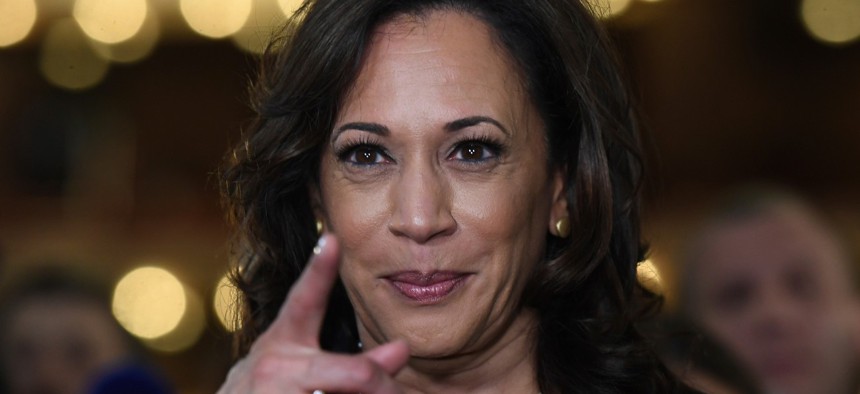
Sen. Kamala Harris, D-Calif., is in the spin room following the Democratic primary presidential debate on June 27. Presumptive Democratic presidential nominee Joe Biden has picked Harris as his running mate. mpi04/MediaPunch /IPX
Here's a Look at Kamala Harris' Record on Federal Workforce Issues
Harris has fought for public sector unions and upholding civil service laws.
Presumptive Democratic presidential nominee Joe Biden on Tuesday announced Sen. Kamala Harris, D-Calif., as his running mate, adding to the ticket a lawmaker with significant experience in federal workforce issues and a history of advocating for employees and their labor groups.
Harris would bring to the executive branch four years of experience on the Senate Homeland Security and Governmental Affairs Committee, and two years on the subcommittee that oversees federal management specifically. She has gained attention for her sharp questioning of witnesses, leading to several high-profile exchanges with Trump administration officials.
During her run for president, Harris stressed the importance of public sector unions and said the organizations were “one of the most important ways to build a strong economy.” In the Senate, she co-sponsored the Protecting the Right to Organize Act, a measure that sought to prohibit legislation that barred unions from automatically charging bargaining unit members a membership fee, known as “right to work” laws. She also co-sponsored the Public Service Freedom to Negotiate Act, which would provide similar rights to state and local government employees as are currently afforded to federal workers. Harris in 2018 pushed the Education Department to walk back its decision to unilaterally implement a collective bargaining agreement.
“We must allow workers to unite and then speak in the collective,” Harris said in a presidential debate last year.
Harris has advocated for federal employees during the novel coronavirus pandemic, signing on to a letter pushing the Trump administration to provide maximum telework during the outbreak. She signed a separate letter in May calling for federal workers on the front lines of the fight against the coronavirus pandemic to receive hazard pay, safety leave eligibility and sufficient personal protective equipment. In June, Harris introduced the 2020 COVID-19 Whistleblower Protection Act to help federal workers who speak out on the misspending of relief funds or endangerment of public health.
“Those working to help manage these funds have an obligation to speak truth when they see wrongdoing, and deserve to be protected when they do,” Harris said.
During a 2018 hearing with then-Office of Personnel Management Director Jeff Pon, Harris questioned the Trump administration’s proposal to fold OPM into the General Services Administration and the White House’s Executive Office of the President. She noted OPM’s independence was essential to setting “standards for holding managers and human resources offices accountable in accordance with merit systems and principles around making personnel decisions based upon merit.”
Harris added: “My concern is if OPM is eliminated, who will take on this independent role in the executive branch to ensure that HR decisions will be in compliance with and adhere to merit-based principles as opposed to politics?”
She also raised concerns about a series of executive orders President Trump issued to make it easier to fire federal employees and limit the power of their unions, focusing specifically on the administration’s attempt to limit workers’ ability to engage in representation activities, or "official time," while on the clock.
“Have you ever had the responsibility of actually working with an employee on a grievance?” Harris asked Pon in criticizing a provision that limited how long a federal employee can spend on official time. “Because if you have, you would appreciate that it takes time to establish a relationship of trust to then understand the experience they’ve had and be familiar with the facts in a way that you can sufficiently represent them in their grievance.”
The senator has faced criticism from progressives for her record as a prosecutor first as the San Francisco district attorney and then as the California attorney general, though in the Senate she has frequently sought to place more stringent oversight on federal law enforcement. Harris at a 2018 hearing pressed Homeland Security Department officials on how the department came up with hiring targets at Immigration and Customs Enforcement and Customs and Border Protection, and later said through a spokesman that the staffing surge was "nothing more than an attempt to fulfill a campaign quota." She criticized efforts to loosen hiring standards to enable the DHS hiring surge, saying Border Patrol agents were vulnerable to corruption.
Harris has called on the Trump administration to focus resources on management challenges at Homeland Security, including pay and training for current personnel. She has also co-sponsored a bill to require CBP to hire thousands of customs officers.
Harris earlier this year introduced the 2020 Justice in Policing Act, which would require federal law enforcement officers to wear body cameras, use de-escalation techniques and employ deadly force only as a last resort. “We are here today with common-sense solutions, at least at the federal level, to hold police accountable,” Harris said.
The presumptive vice presidential nominee has spoken out on the damaging effects of government shutdowns on the federal workforce and brought an affected employee—an air traffic controller—as her guest to Trump’s State of the Union address in 2019. She pledged during her failed presidential bid to fully fund federal agencies to ensure employee experts have adequate resources, saying as part of her climate plan she would empower feds to "conduct unbiased scientific assessments."







